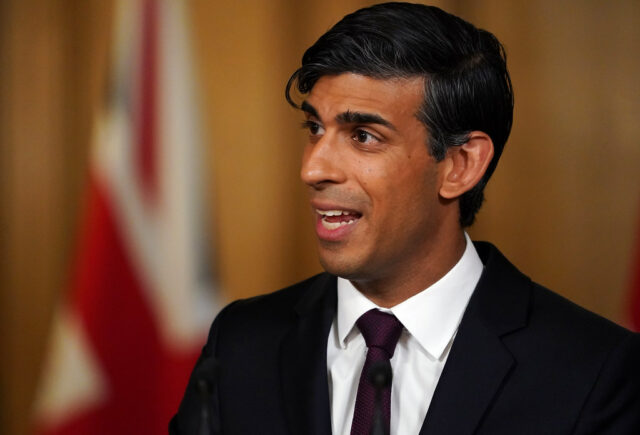NEW DELHI: The United Kingdom aims to revise its strategic priorities in order to respond to the rapidly changing events across the world.
This was laid out in a policy paper titled “Integrated Review Refresh 2023: Responding to a more contested and volatile world” which was tabled before the British Parliament on March 13.
Broadly, the paper builds on a similar document called Integrated Review 2021, or IR2021, which “identified four trends that would shape the international environment to 2030: shifts in the distribution of global power; inter-state, ‘systemic’ competition over the nature of the international order; rapid technological change; and worsening transnational challenges.
“The government’s decision to publish the IR refresh (IR2023) reflects the pace at which these trends have accelerated over the past two years. In that time, the transition into a multipolar, fragmented and contested world has happened more quickly and definitively than anticipated. We are now in a period of heightened risk and volatility that is likely to last beyond the 2030s. IR2023 updates the UK’s priorities and core tasks to reflect the resulting changes in the global context,” says the introduction to the paper.
Apart from Covid 19 which showed how events that begin overseas can impact the world, it says that since the last report, “Russia’s illegal invasion of Ukraine, weaponisation of energy and food supplies and irresponsible nuclear rhetoric, combined with China’s more aggressive stance in the South China Sea and the Taiwan Strait, are threatening to create a world defined by danger, disorder and division – and an international order more favourable to authoritarianism.”
Other challenges such as Islamist terrorism and serious and organised crime, large-scale migration, smuggling of people, narcotics and weapons, and illicit finance “have become more acute, with grave human costs and strain on our national resources,” it says.
In a significant admission, the paper notes that “systemic competition is developing into a highly complex phenomenon that we must navigate with an understanding that not everyone’s values or interests consistently align with our own. Today’s international system cannot simply be reduced to ‘democracy versus autocracy’, or divided into binary, Cold War-style blocs.”
An expanding group of ‘middle-ground powers’ are of “growing importance to UK interests as well as global affairs more generally, and do not want to be drawn into zero-sum competition any more than the UK does. We will need to work with these countries to protect our shared higher interest in an open and stable international order, accepting that we may not share all of the same values and national interests,” it concludes.
Describing systemic competition as the dominant geopolitical trend and the main driver of the deteriorating security environment, it warns that a growing convergence of authoritarian states are “challenging the basic conditions for an open, stable and peaceful international order, working together to undermine the international system or remake it in their image.”
The Chinese Communist Party (CCP) is increasingly explicit in its aim to shape a China-centric international order more favourable to its authoritarian system, “and pursuing this ambition through a wide-ranging strategy – shaping global governance, in ways that undermine individual rights and freedoms, and pursuing coercive practices” it says, adding that China’s deepening partnership with Russia and Russia’s growing cooperation with Iran in the wake of the invasion of Ukraine “are two developments of particular concern.”
The paper also says that “The UK’s long-standing commitment to multilateralism remains the foundation of this approach to…create the conditions, structures and incentives necessary for an open and stable international order,” and that “moving beyond IR2021, the UK will support reform of the UN Security Council (UNSC) – and would welcome Brazil, India, Japan and Germany as permanent members.”
As for the Indo-Pacific region, “we will also more closely align our efforts with partners pursuing Indo-Pacific strategies, including the ASEAN, Canada, the EU, France, Germany, India, Japan, the Republic of Korea and the US,” the paper says.
With India, the focus would be on “building on our Comprehensive Strategic Partnership, implementing the UK-India 2030 Roadmap, supporting India’s G20 presidency, advancing negotiations on a FTA, strengthening our defence and security partnership, progressing collaboration on technology and leading the maritime security pillar of India’s Indo-Pacific Oceans Initiative,” it says.
“S&T, trade and economic connectivity are also vital to these Atlantic-Pacific ties, which will continue growing in importance over the rest of the decade. In this context, the well-established Five Eyes grouping will continue to play a critical role, both in its core mission of intelligence sharing, and in the broader defence and security cooperation it now supports,” the paper notes.
In conclusion, the paper says the new strategic priorities rest on four broad pillars. These are :
1. Shape the international environment, which essentially involves working with all who support an open and stable international order and the protection of global public goods.
2. Deter, defend and compete across all domains: Reinforces the shift to an integrated approach to counter both state threats and transnational security challenges. NATO is at the core of this effort, but effective deterrence will mean working through other groupings and beyond the Euro-Atlantic theatre.
3. Address vulnerabilities through resilience: This pillar develops the UK’s approach to resilience, shifting to a long-term campaign to address the vulnerabilities that leave the UK exposed to crises and hostile actors.
4. Generate strategic advantage: Indispensable to maintaining the UK’s freedom of action, freedom from coercion in a more contested environment, and the ability to cooperate with others, this underpins the other pillars of the strategic framework.
















